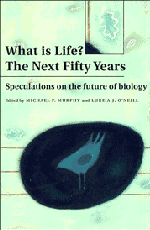Book contents
- Frontmatter
- Contents
- List of contributors
- Preface
- 1 What is Life? The next fifty years. An introduction
- 2 What will endure of 20th century biology?
- 3 ‘What is life?’ as a problem in history
- 4 The evolution of human inventiveness
- 5 Development: is the egg computable or could we generate an angel or a dinosaur?
- 6 Language and life
- 7 RNA without protein or protein without RNA?
- 8 ‘What is life?’: was Schrödinger right?
- 9 Why new physics is needed to understand the mind
- 10 Do the laws of Nature evolve?
- 11 New laws to be expected in the organism: synergetics of brain and behaviour
- 12 Order from disorder: the thermodynamics of complexity in biology
- 13 Reminiscences
- Index
3 - ‘What is life?’ as a problem in history
Published online by Cambridge University Press: 03 February 2010
- Frontmatter
- Contents
- List of contributors
- Preface
- 1 What is Life? The next fifty years. An introduction
- 2 What will endure of 20th century biology?
- 3 ‘What is life?’ as a problem in history
- 4 The evolution of human inventiveness
- 5 Development: is the egg computable or could we generate an angel or a dinosaur?
- 6 Language and life
- 7 RNA without protein or protein without RNA?
- 8 ‘What is life?’: was Schrödinger right?
- 9 Why new physics is needed to understand the mind
- 10 Do the laws of Nature evolve?
- 11 New laws to be expected in the organism: synergetics of brain and behaviour
- 12 Order from disorder: the thermodynamics of complexity in biology
- 13 Reminiscences
- Index
Summary
WHAT IS LIFE? AS A MODERNIST MANIFESTO
The obviously true may be devilishly difficult to define – as best exemplified by Louis Armstrong's famous retort to a naively passionate fan's request for a definition of jazz: ‘Man, if you gotta ask you'll never know.’ It is similarly undeniable that Erwin Schrödinger's What is Life? ranks among the most important books in 20th century biology, but the reasons for its great influence seem oddly elusive. Brevity may be the soul of wit (as garrulous old Polonius told us), and short works are rare blessings in a profession that too often judges worth by literal ponderousness. But What is Life?, in its ninety pages, seems a bit too spare and too elliptical to carry such intellectual weight (though, in a ruthlessly practical sense, such brevity may define the essential differences between attention and oblivion in a profession dominated by doers rather than readers). For example, I think we maybe confident of the correct, if necessarily conjectural answer to an old puzzle in ‘iffy’ history: how would the history of science have differed if Wallace had never lived and Darwin had thereby acquired the leisure to write the many-volumed work he intended, rather than the hurried ‘abstract’ known as the Origin of Species? The answer – since the intellectual world was clearly poised to accept evolution – must be: none whatsoever, except that Darwin would have had the same impact with many, many fewer people having read the book. Moreover, much of What is Life?'s intellectual foundation – Delbrück's early ideas on reasons for the gene's stability – turn out to be quite wrong (see Crow, 1992, p. 238).
- Type
- Chapter
- Information
- What is Life? The Next Fifty YearsSpeculations on the Future of Biology, pp. 25 - 40Publisher: Cambridge University PressPrint publication year: 1995
- 13
- Cited by



